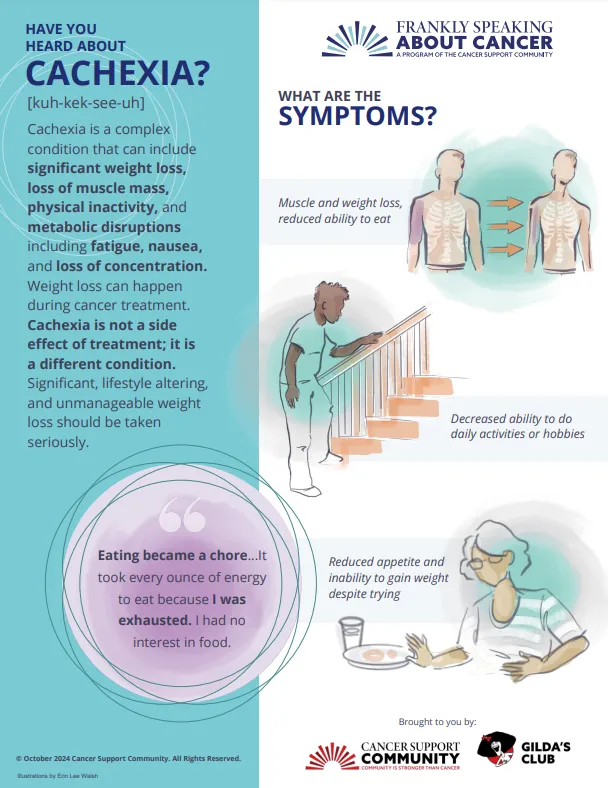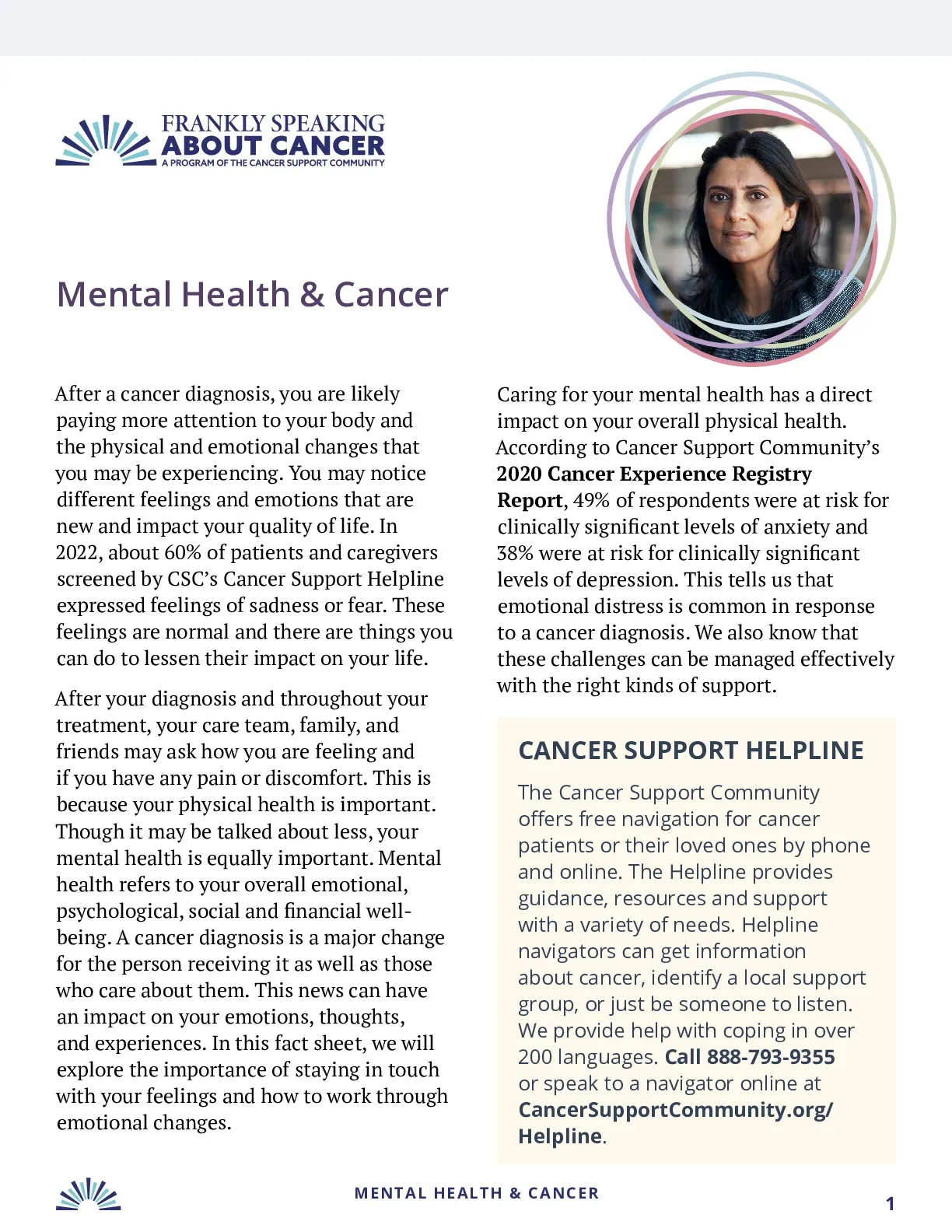Understanding Cancer Cachexia
Table of Contents

What Is Cancer Cachexia?
It is common for people with cancer to lose weight. This may be due to treatment side effects like trouble swallowing, mouth sores, nausea, or decreased appetite. However, drastic and unintended weight loss may be due to a condition that is caused by the cancer itself. Doctors refer to this condition as cachexia [kuh-kek-see-uh]. Cachexia is also sometimes called cancer cachexia or wasting syndrome.
Cachexia is not a side effect of treatment; it is a different condition.
Are You a Healthcare Provider?
Access our free guide for providers and advocacy organizations, designed to facilitate discussions about cachexia with patients.
Who Is at Risk?
Cachexia can affect anyone with a chronic illness, regardless of their weight.
Cachexia is estimated to occur in up to 80% of people with various types of advanced cancer, depending on the cancer type and how well they respond to treatment.
People with a diagnosis of pancreatic, lung, head and neck, colorectal, ovarian, and liver cancers are at higher risk of developing cachexia.
Eating became a chore...It took every ounce of energy to eat because I was exhausted. I had no interest in food.
Signs & Symptoms
Many people living with cancer may think their muscle loss and weakness is caused by decreased physical activity or natural aging (sarcopenia) instead of cachexia. It's important to note that any significant, lifestyle-altering, and unmanageable weight loss should be taken seriously.
Cachexia is a complex condition that can include:
Weight & muscle loss – The most common sign of cancer cachexia is drastic and unintended weight loss. This includes loss of muscle mass.
Reduced appetite – People with cancer cachexia may have little or no desire to eat. It may also be hard to gain weight, despite trying.
Physical inactivity – Cachexia can make it hard for people to do everyday activities and tasks they previously did routinely, such as walking, climbing stairs, bathing, or doing chores.
Metabolic disruptions – These may include fatigue, nausea, loss of concentration, or any combination of these.

Cope With Eating Problems
Discover strategies to manage eating & nutrition challenges like weight loss, appetite changes, and fatigue.
How Is Cachexia Treated?
It's important to consult your healthcare team for options to address this condition.
Oncology providers typically recommend increasing caloric intake. However, new research suggests that eating more calories and taking nutritional supplements may be insufficient.
Research suggests that people experiencing (or at risk for developing) cachexia should schedule a visit with a registered dietitian and follow their personalized advice. For additional nutrition support, there are also resources like Savor Health’s Intelligent Nutrition Assistant, Ina®, that provides free, 24/7, unlimited, HIPAA-compliant, and secure nutrition services, all from your phone.
Some cancer survivors have identified strategies to increase their nutrient absorption, such as:
- consuming nutrient-dense liquids like broths or protein shakes
- cutting out caffeine and alcohol
- increasing dietary fiber to support digestion

Healthy Meal Ideas
Explore nourishing recipes to address cancer-related eating challenges like nausea, fatigue & changes in taste.
What Can You Do?
If you are experiencing cachexia-like symptoms, or suspect you may have cancer cachexia, speak to your oncology care team as soon as possible. Early intervention matters. It is important to monitor weight loss and muscle strength throughout treatment.
Current research suggests a team approach is best to address the symptoms of cachexia. Your care team may refer you to one or more of the following healthcare professionals:
- Dietitian
- Endocrinologist
- Palliative Care Specialist
- Physical Therapist
- Occupational Therapist
- Social Worker
Oncology dietitians can create a personalized list of foods and supplements to maximize nutrient absorption.
Meeting with an oncology dietitian on a regular basis allows them to help people cope with eating problems as they occur. Some of the things they can assist with include plans for weight changes, side effect or symptom management, feeding tube formula help, and help with dietary supplements, special diets, food allergies, and intolerances.
Endocrinologists specialize in metabolic disorders and can help address metabolic changes.
Palliative care specialists can improve quality of life by treating symptoms of muscle loss and nausea related to cachexia.
Physical therapists can help after surgeries and other treatments to address muscle loss. Some people may be able to manage symptoms through physical rehabilitation or physical therapy.
Occupational therapists can help people experiencing cachexia maintain and restore their ability to complete daily activities.
Social workers can help people find resources and support.

Reach Out to Our Helpline
We offer free navigation for cancer patients or their loved ones.
Coping With Cachexia-related Distress
Cachexia can cause significant mental and emotional distress for both patients and caregivers.
Uncertainty around treating and improving cachexia symptoms can be stressful. In addition, some people may feel anxious or less confident about the way they look because of changes in appearance caused by cachexia. For caregivers, it can be difficult to watch a loved one lose weight and have no appetite to eat.
Seeking support for cachexia-related distress can help people manage the mental and emotional effects of the condition and help improve quality of life.
Tools to cope with the emotional side effects of cancer cachexia include:
- Attending individual, couples, or family counseling
- Joining a support group
- Practicing yoga or meditation
In 2021, the Cancer Support Community held a virtual meeting to raise awareness about the impact of cancer cachexia. This meeting was focused on listening to and learning from patients and caregivers. Watch a recording of the meeting to hear these personal perspectives and other insights on cancer cachexia.
Frankly Speaking About Cancer Library
LibraryWould you like a print copy of these educational materials?
We can mail our Frankly Speaking About Cancer pieces to you. Shipping is free for up to 20 pounds.


